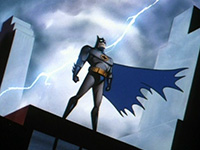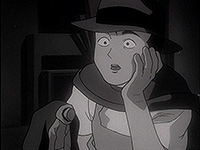 |
The Definitive Batman
Posted:
September
18, 2004
Batman: The Animated Series is the best animated superhero series ever made. Okay, that might not be the boldest or most controversial claim anyone can make about the series. And, after ten years of increasingly sophisticated animation series (many of them following on or influenced by BTAS), some people might argue on behalf of other candidates. So let's go at this in another direction and say that the greatness of the series lies in its uniqueness. Most superhero shows entertain, but BTAS persuades.
 "Persuades"
is an odd word to use, of course. But it's a fitting word, because BTAS
is a show that convinces us of its own reality. The characters and situations
may be exaggerated, but they are merely distortions of a recognizable
reality. So, Batman himself may have heightened abilities and a tragic
backstory, but he remains just a man with very human strengths and frailties.
Other heroes embark on grand adventures of earth-shattering importance,
but Batman fights on the streets and rooftops of an ordinary city. He
doesn't fight for grand abstractions (like "truth, justice and the
American way") or to save the great and undistinguished glob of humanity;
he fights to save particular individuals who are in particular trouble,
and his enemies are usually just other weak and foolish human beings driven
by madness or obsession or despair into evil acts. Batman knows the faces
and stories of each person he meets, and his adventures take us directly
into the worlds of those characters.
"Persuades"
is an odd word to use, of course. But it's a fitting word, because BTAS
is a show that convinces us of its own reality. The characters and situations
may be exaggerated, but they are merely distortions of a recognizable
reality. So, Batman himself may have heightened abilities and a tragic
backstory, but he remains just a man with very human strengths and frailties.
Other heroes embark on grand adventures of earth-shattering importance,
but Batman fights on the streets and rooftops of an ordinary city. He
doesn't fight for grand abstractions (like "truth, justice and the
American way") or to save the great and undistinguished glob of humanity;
he fights to save particular individuals who are in particular trouble,
and his enemies are usually just other weak and foolish human beings driven
by madness or obsession or despair into evil acts. Batman knows the faces
and stories of each person he meets, and his adventures take us directly
into the worlds of those characters.
So instead of gleeful, knuckle-cracking would-be world conquerors, we get Victor Frieze, driven to vengeance by the loss of his wife; Jervis Tetch, lost in a frenzied loneliness; Matt Hagen, physically destroyed by the greed of a business tycoon; Lloyd Ventriss, an ex-con who only wants his daughter back. There is a minuteness to their motives, but that doesn't diminish them. Instead, by making their villainy pivot on the smallest of points, the show reminds us of our own frailty.
By concentrating on character this way, BTAS loses none of its glamour as an action show, but it gains so much more. There is a dramatic intensity to the confrontations in "Heart of Ice," "Mad as a Hatter," "Feat of Clay" and "See No Evil" that other shows miss. It's a truth that live-action movies, as they have grown more cartoonish, seem to have forgotten: viewers care more about story than about spectacle, more about characters than about scenarios. By starting with the basics of drama and getting those right, BTAS is able to capture and hold our attention even when the fight scenes don't work. And about how many other series can you ever say, "That was great, even though the action scenes sucked"?
Other superhero series have tried for psychological depth by concentrating on the special problems that beset people who have superpowers, or by using the existence of meta-humans to make social comment. These are worthy stories to tell, but they are ultimately distancing: few of us have superpowers (if you'll permit the understatement), and so few of us can easily identify with the problems of those who do. In BTAS, the personal problems and crises exist independent of the superpowers or the supergizmos, and so we can appreciate those problems without worrying too much about the freeze guns or the shape-shifting abilities. We would know and feel for these characters even if they did not have any special "schtick."
There is also the "look" of the show. With Superman, Batman Beyond and Justice League, Bruce Timm's style has grown smoother and more kinetic, but there are still many fans who would say that BTAS remains the best looking of the lot. I think that has to do with the detail and the sense of baggy solidity that the characters and setting have. They're not slick: they look rumpled, lived in, worn out and corruptible. Everyone would prefer to live in Metropolis, but we look around us and know in our bones that we live in Gotham City.
Finally, there is the series' structure. There is no overarching continuity (although, in some cases it is clear that certain episodes precede others) and there is no developmental direction. Instead, BTAS is structured as a set of mini-movies, each one sufficient to itself. It might seem that this would cut against the sense of reality by not giving us a structured universe. Paradoxically, however, it creates a greater sense of verisimilitude. By filling its universe with stories unconnected to each other, BTAS makes that universe feel, at the same time, both very large and very complex and finely detailed. The pattern it creates is so large that it can only be glimpsed as an abstraction: Gotham City suffers under no great tragedy, but (as in life) only from innumerable small tragedies, each of which can only be solved on its own.
 You
can now get that sense of the show's scope and detail in one sitting (if
you have a day free) and without commercial interruption, for Warner Home
Video has finally given us what we've spent years asking for: the first
volume of a set of DVD releases. Batman
: The Animated Series (Volume 1) collects the first twenty-eight
episodes of the series, from "On Leather
Wings" (the brilliant series premiere) through "Dreams
in Darkness." It's been a long time since the series has aired
on television, and if you're like me and have been watching them on ancient
videotapes recorded off the original broadcasts, the images and sounds
will almost come as a revelation, with inky blacks and dusky browns and
reds playing over Shirley Walker's thundering scores. Extras are spare:
there are fun and interesting commentaries by Timm, Eric Radomski and
Paul Dini for "On Leather Wings"
and "Heart of Ice"; a decent
retrospective featurette; and an utterly pointless "Tour of the Batcave."
The highlight of the extras, though, has got to be the promotional reel
that the producers put together when they pitched the show to the studio:
though it is short and very similar to the series' title sequence, it
will make you regret that there are not "lost" episodes out
there waiting to be rediscovered.
You
can now get that sense of the show's scope and detail in one sitting (if
you have a day free) and without commercial interruption, for Warner Home
Video has finally given us what we've spent years asking for: the first
volume of a set of DVD releases. Batman
: The Animated Series (Volume 1) collects the first twenty-eight
episodes of the series, from "On Leather
Wings" (the brilliant series premiere) through "Dreams
in Darkness." It's been a long time since the series has aired
on television, and if you're like me and have been watching them on ancient
videotapes recorded off the original broadcasts, the images and sounds
will almost come as a revelation, with inky blacks and dusky browns and
reds playing over Shirley Walker's thundering scores. Extras are spare:
there are fun and interesting commentaries by Timm, Eric Radomski and
Paul Dini for "On Leather Wings"
and "Heart of Ice"; a decent
retrospective featurette; and an utterly pointless "Tour of the Batcave."
The highlight of the extras, though, has got to be the promotional reel
that the producers put together when they pitched the show to the studio:
though it is short and very similar to the series' title sequence, it
will make you regret that there are not "lost" episodes out
there waiting to be rediscovered.
But even if the collection is thin on extras, such extras are not the point of a collection like this. The point to owning this collection is to get the series together in a final and beautiful package. Batman: The Animated Series is, as I said at the top, the best animated superhero series ever made. Richly made, smart and adult in its attitude and sensibilities, this is a collection that everyone should have.
The preceding was originally published by Toon Zone. It is reprinted by permission.